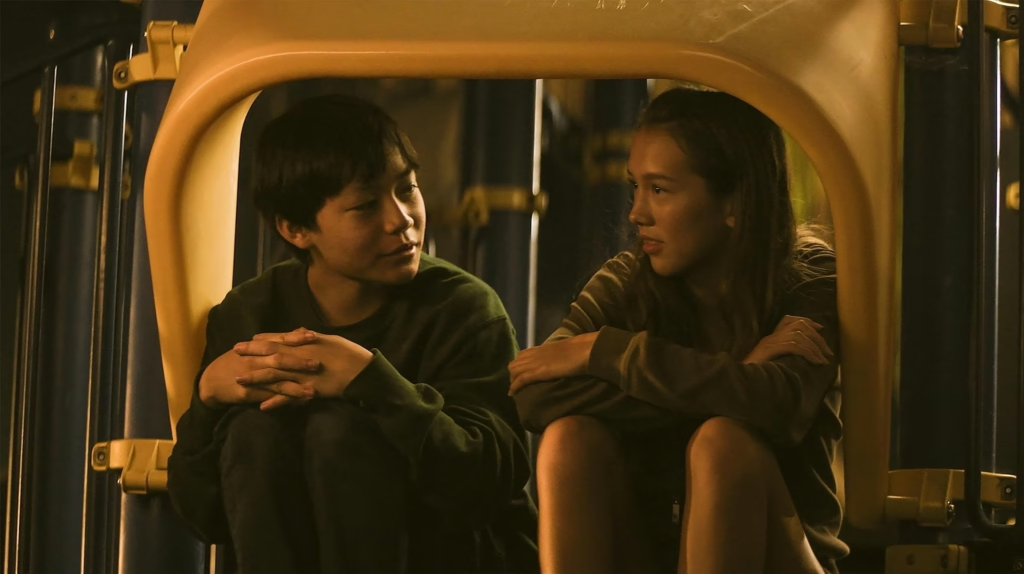Sean Wang’s coming-of-age film Dìdi follows a Taiwanese American boy named Chris as he experiences the tumult of his early teen years. Set in 2008 in California, it explores the insecurities and cultural clashes that shape adolescence. Director Wang drew from his own experiences growing up to craft a remarkably authentic portrait.
The film’s protagonist is 13-year-old Chris Wang, called “Dìdi” by his family. He finds himself caught between worlds as a Taiwanese child navigating American culture. Chris struggles with his identity among different social circles. At home, his heritage is celebrated, but he downplays it elsewhere, wanting acceptance. This summer, before high school, brings new questions about who he wants to be.
Wang captures it all with keen empathy. The period details from technology to fashion ring true, putting viewers back in the late 2000s. More than nostalgia, though, the film understands the messy dynamics of family, friendship, and first crushes. Wang shines a light on the insecurity all teens feel but rarely see represented, and she does so through an Asian American lens.
With a superb cast, including Izaac Wang as Chris, Dìdi brings viewers into the heart of one boy’s experience. It’s a poignant coming-of-age story about growing pains, cultural discovery, and ultimately realizing where we belong. Rich with authenticity and heart, the film is an impressive debut from a director in tune with the dynamics that shape our transitions to adulthood.
Navigating Identity
The film follows Chris Wang over the summer before beginning high school as he grapples with figuring out who he is. At home, he’s known as Dìdi, but prefers to be called Chris by his friends at school. He’s surrounded by cultural influences too; his mother and grandmother speak Mandarin while he communicates solely in English.
As the summer begins, Chris spends much of his time with longtime friends Fahad and Soup. The three enjoy making humorous videos together to post online. It’s a way for Chris to express himself, though he struggles when it comes to face-to-face interactions. He has his eye on a girl named Madi but isn’t sure how to talk to her.
Chris then meets an older group of skaters, who invite him to film videos of their tricks. Hoping to impress them, he tries to downplay his Taiwanese heritage and fails when attempting to join in on their antics. Though he experiences belonging with the new friends, underlying insecurities remain.
At home, tension grows between Chris’s outspoken sister as she prepares to leave for college. He also bristles at his mother’s traditional ways but finds solace in his grandmother. As the summer progresses, Chris yearns for independence while still clinging to family connections.
When Chris learns the skater friends view him differently, old doubts resurface. In a heartfelt moment, his mother reassures him of her love and acceptance. The film’s conclusion suggests Chris has begun embracing all parts of himself, poised to navigate high school with newfound confidence and understanding of his evolving identity.
Nailing the Noughties
Director Sean Wang put in the work to authentically capture what it was like growing up Taiwanese-American in northern California during the mid-2000s. Having experienced this period of his life firsthand, Wang was uniquely positioned to share such an insightful coming-of-age story.
Wang drew from his own adolescent experiences, modeling the film’s protagonist, Chris, after himself. Like Chris, Wang navigated balancing his cultural identity at home with the desire to fit in with his peers. This self-reflection lends Dìdi an intimate feel, with the audience understanding Chris in a rich, multidimensional way.
To further immerse the viewer, Wang filled the film with precise period details that transport us straight back to 2008. From the ubiquitous flip phones and bulky computers to the popular bands plastered across t-shirts, Dìdi nails the technology, fashion, and music iconic to that era.
Wang even shot the film within his childhood home, capturing the actual neighborhood and houses familiar to him. These authentic locales, paired with realistic family interactions, bring tangible warmth to Chris’s world.
Methodical in his research, Wang ensured everything on screen aligned with life as an early social media-using teen. He portrays the digital landscape in all its evolving complexity, whether MySpace is just giving way to Facebook profiles or instant messages are still the prime way to contact crushes.
Thanks to Wang’s devotion to accuracy, Dìdi achieves that special nostalgia of profoundly recalling a past period, both culturally and personally. His nuanced direction preserves the rawness of discovering oneself during those transitional middle school years.
By drawing from his own background for an artful coming-of-age story, Sean Wang crafted a meaningful, resonant film that will live on, introducing audiences to life as a young Taiwanese American navigating joy, heartbreak, and identity in the late 2000s.
Captured Performances
Izaac Wang delivers a breakthrough performance at the heart of Dídi. His portrayal of Chris feels deeply authentic; you can see the insecurity, angst, and longing in his expressive face. Wang grasps the messy complexity of adolescent emotions with nuance well beyond his years.
Chris constantly shifts between stances, unsure where he truly fits in. Wang navigates these bumpy identity struggles with raw vulnerability. Whether stubbornly dismissing his mother or tentatively testing new social circles, Chris’ uncertainty feels genuinely relatable through Wang’s talented acting.
Joan Chen as Chris’ mother, Chungsing, grounds the film in tenderness. Under Chen’s performance lies a mother’s endless care for her family despite daily frustrations. Her wide-ranging reactions, from shared laughter with Chris to quiet sadness alone, create a poignant portrait of a woman giving all she has to her loved ones.
The meticulous relationship work between Wang and Chen makes their mother-son bond feel richly three-dimensional. From meaningful gestures to heated blowups, their subtle performances illuminate the intense tug between dependence and independence defining Chris’ pivotal summer.
Director Sean Wang surrounds the leads with a strong supporting cast. Shirley Chen offers the same the same vivacious wit as Chris’ older sister Vivian. Vivian’s college countdown creates lively sibling banter, contrasting Chris’ emotional unrest. Raul Dial and Aaron Chang infuse authentic energy into Chris’ lifelong friendships, tested by change.
Chang Li Hua brings warmth and humor as Nai Nai, Chris’ grandmother. Nai Nai offers Chris an anchoring familial acceptance, though her prickly interactions with Chungsing hint at a layered backstory. These fully-formed portrayals add vibrant texture to Chris’ interpersonal world.
Carefully portrayed character arcs like Fahad’s sliding “coolness” showcase the evolving, growing pains of adolescence. Dídi’s talented cast conveys honest, empathetic stories that will speak deeply to anyone navigating their own self-discovery journey.
Navigating Teenage Tides
Dìdi offers an insightful glimpse into the common struggles of adolescence. Writer-director Sean Wang draws on his own experiences to craft affectionate yet unvarnished portrayals.
Our protagonist, Chris, finds himself caught in a turbulent transition between childish freedom and new pressures. As his interests shift towards girls and independence, familiar names like “Dìdi” stir self-consciousness.
Izaac Wang brings lived-in authenticity to Chris’ fluctuating moods. Fumbling attempts to impress his crush reveal fluttering teen hormones alongside nerves around being different. His character’s journey honors the messy complexity within each evolving young person.
Family brings comfort yet adds confusion for Chris. Loving but critical grandmother Nai Nai adds humor while stressing his mother. Their exchanges, facilitated by Chang Li Hua’s and Joan Chen’s natural performances, emphasize the intergenerational tensions many immigrant families face.
Chris’ uncertainty around his identity parallels his mother’s own stifled potential. She supports her family through sacrifice, mirroring the challenges women of her background often face. Their relationship, conveyed by Chen and Wang’s emotionally nuanced work, underscores mutual care beneath surface frustration.
Small yet poignant scenes capture shared anxieties. When Chris asks if his mother finds him a disappointment, her assurances quietly validate the doubts many feel pleasing parents. His awkward party entrance, handled with a relatable cringe by Wang, relives the isolation of feeling younger among perceived peers.
Throughout, Dìdi honors fleeting magic within everyday moments. Whether laughing with grandparents or finding connection through new interests, it presents teenage life in all its richness. Wang’s film warmly reminds us that, with time and compassion, even the roughest patches smooth into valuable lessons of self-understanding.
Remembering Those Awkward Years
Sean Wang’s film Dìdi proves a master at evoking nostalgia without relying on superficial nods to the past. Transporting viewers to 2008 through intricate cultural details, the story achieves something far more profound: giving modern audiences a chance to reflect on those ever-awkward teenage years.
From frenzied Google searches for social cues to anxious Facebook photo curation, Chris’ digital world feels strikingly authentic. Memories of similar insecurities flood back for those who grew up entangled in blossoming social media.
Wang captures unchanging adolescent rhythms too, like fleeting summer freedom and the looming changes high school brings. His young cast delivers broken hearts, newfound crushes, and fluctuating friendships with raw sincerity. Though technology shapes experiences differently, the feelings remain recognizable.
Across generations, most will relate to Chris’ struggle to discover identity amid shifting relationships. Trying on personas to impress peers while staying true to oneself—it’s a journey still ongoing for many.
Dìdi poignantly captures this universal journey within a particular cultural context. Chris navigates pressure from immigrant roots alongside typical growing pains. Both elders adjusting to a new country and youth asserting independence will find reflections.
By honoring shared humanity over surface nods, Wang taps nostalgia’s power to bring people together. Viewers leave with compassion for their own past selves and others navigating life’s bumpy roads. Most of all, they reminisce about the bittersweet beauty within even our most cringe-worthy years.
Through its blend of accuracy and heart, Dìdi transforms fleeting moments into lasting lessons. It reminds us that no matter where we come from or the technology shaping our times, growing up remains a journey ultimately without borders.
Finding Yourself
Dìdi tells a powerful coming-of-age story that will resonate with any viewer. Sean Wang crafts a film so true to life, it feels like revisiting your own teenage years.
The movie follows Chris through an awkward summer as he navigates changing friendships, new feelings, and growing independence. Viewers see themselves in every fumbled interaction or silly feud with family. Yet Wang captures these familiar beats with striking authenticity through his leading actors.
Izaac Wang especially shines as Chris. Beyond hilarious comedic beats, he brings soulful nuance to a young boy discovering who he is. Every flutter of excitement or flash of pain feels genuine. His bond with Joan Chen’s dedicated mother anchors the film with heart.
Through it all, Dìdi never feels saccharine or preachy. Wang honors messy complexity, as all people struggle to understand themselves. With compassion, he portrays pressing issues like cultural identity and the desire to fit in.
By the film’s end, Chris takes steps toward acceptance. Not through easy answers, but with hard-won self-awareness. Wang ensures the journey, not the destination, is what inspires.
For any viewer questioning their place in the world, Dìdi offers solace. It proves growing pains are universal, even as experiences differ. With deft filmmaking, Sean Wang gifts insight into life’s journey of constant change and the beauty of finding yourself along the way.
The Review
Dìdi
In conclusion, Dìdi is a masterful coming-of-age story that rings with heartfelt authenticity. Director Sean Wang crafts a deeply resonant tale of self-discovery through immense compassion. Never saccharine but discerningly bittersweet, it proves the timeless power of exploring life's enduring truths through keen specificity of time and place. Anchored by stellar performances and imbued with keen artistic vision, Dìdi is a breathtakingly genuine snapshot of youth that will no doubt stand the test of time.
PROS
- Authentic portrayal of teen experience
- Compassionate handling of cultural identity themes
- Stellar performances, especially from Izaac Wang
- Evocative nostalgia for the 2000s era
- Balanced humor and heart throughout
CONS
- Some storylines feel unfinished
- May hit too close to home for some
- A slow pace won't appease all audiences
- Could have explored family dynamics more






















































Discussion about this post